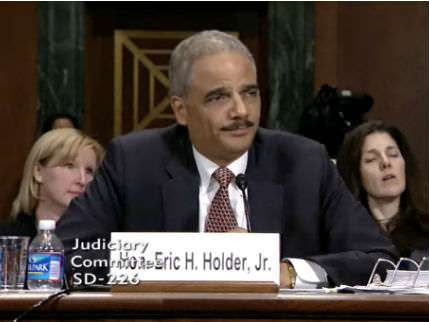Holder's Worrisome Assurances About the President's Power to Kill Suspected Terrorists

How hard would it be for the White House to say, in response to Rand Paul's probing and important questions about the president's license to kill, that the government does not have the authority to use lethal force against a suspected terrorist within the United States—regardless of his nationality—unless doing so is necessary to prevent him from killing innocent people? It would be quite easy, compared to the absurd evasions and red herrings the White House has offered so far. Hence the suspicion that President Obama wants to leave open the possibility of ordering a domestic hit if he thinks it's "appropriate," as Attorney General Eric Holder might put it. The administration's assurances so far leave some pretty big loopholes.
In his March 4 letter to Paul, Holder told the Kentucky senator "the U.S. government has not carried out drone strikes in the United States and has no intention of doing so." But he added that "in the circumstances of a catastrophic attack like the ones suffered on December 7, 1941, and September 11, 2001," he "would examine the particular facts and circumstances before advising the President on the scope of his authority." That phrasing suggests Holder is not talking about using force to defend against an attack, which clearly would be justified. If a plane were about to crash into the Capitol or the White House, there would be neither the need nor the time to "examine the particular facts and circumstances before advising the President on the scope of his authority." So what was Holder imagining when he raised this possibility? Only he knows for sure.
When Holder testified before the Senate Judiciary Committee yesterday, Sen. Ted Cruz (R-Texas) asked him a straightforward question: Is killing a suspected member or ally of Al Qaeda on U.S. soil constitutional if he does not pose an immediate threat of violence? Since the Justice Department says it is legal to kill such people in other countries, and since it ties this power to the Authorization for the Use of Military Force that Congress approved after 9/11, which it says includes no geographic limits, Cruz's question was perfectly reasonable. Yet Holder repeatedly dodged it, to the point that Cruz gave up on getting a straight answer, complaining that Holder kept talking about the propriety of using deadly force against a suspected terrorist who is just "walking down a path" or "sitting in a café" (as in Cruz's hypothetical) instead of its constitutionality. At the very end of the exchange, Holder made a confusing statement that Cruz interpreted as a concession: "Translate my 'appropriate' to no. I thought I was saying no." No to what was not clear, since Cruz had phrased his question several different ways.
In his two-sentence letter to Paul today, Holder writes: "It has come to my attention that you have now asked an additional question: 'Does the President have the authority to use a weaponized drone to kill an American not engaged in combat on American soil?' The answer to that question is no." Earlier today Brian Doherty noted that "engaged in combat" is ambiguous, especially because the Obama administration argues that the people it identifies as members or allies of Al Qaeda are engaged in combat even when they are driving down the street or sitting in their homes, far from any active battlefield. Furthermore, the question Holder chose to answer is restricted to targeted killings using "weaponized drones," leaving open the possibility that other methods could be used, and it applies only to U.S. citizens, leaving open the possibility that immunity from summary execution in this country hinges on nationality.
Parsing Holder's statements this way may seem far-fetched, but he should not be allowed any wiggle room, given the way the administration has twisted language to justify what looks like assassination as an act of self-defense. In its white paper on targeted killings, for instance, the Justice Department redefines "imminent threat" so that it means no more than an asserted association with Al Qaeda or an allied group. As Sen. Mike Lee (R-Utah) noted at yesterday's hearing, "the white paper goes so far as to suggest that imminence doesn't really need to involve anything imminent," since its definition "does not require the United States to have clear evidence that a specific attack on U.S. persons and interests will take place in the immediate future."


Show Comments (28)